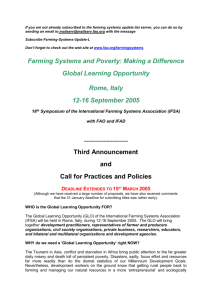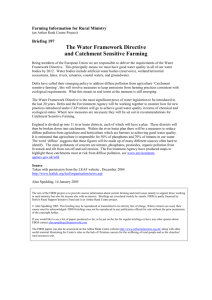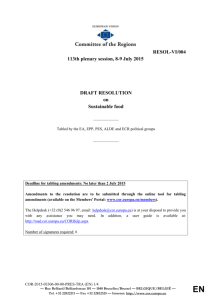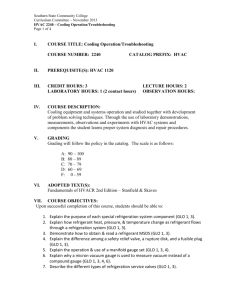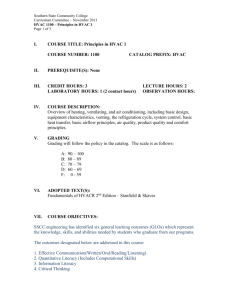What is GLO
advertisement
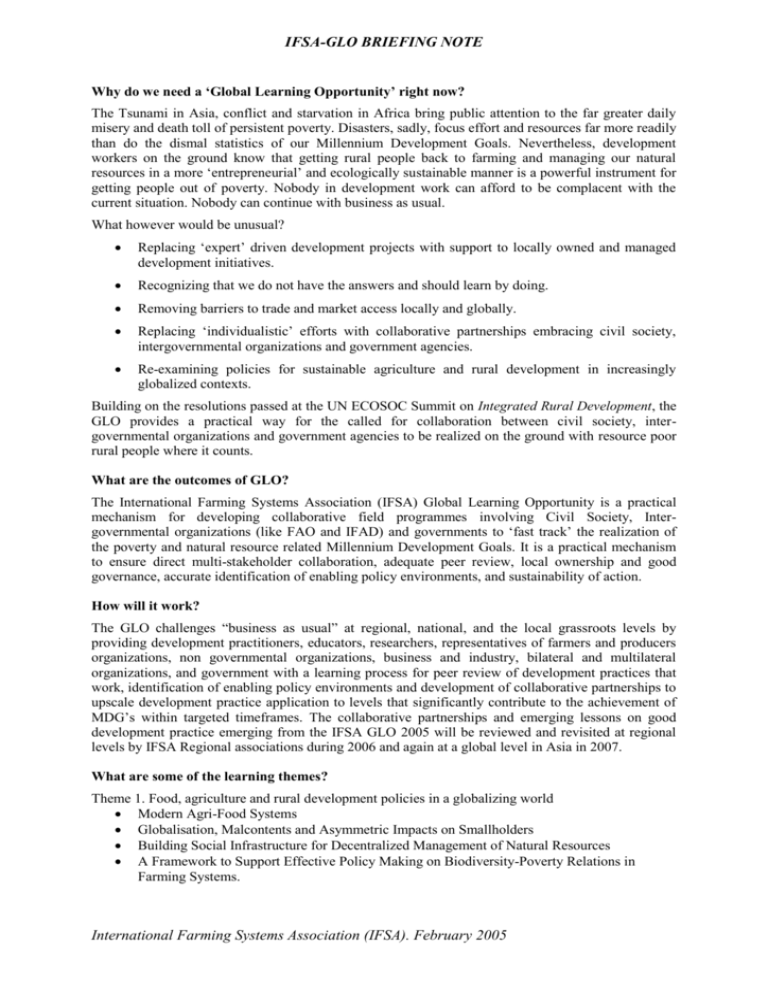
IFSA-GLO BRIEFING NOTE Why do we need a ‘Global Learning Opportunity’ right now? The Tsunami in Asia, conflict and starvation in Africa bring public attention to the far greater daily misery and death toll of persistent poverty. Disasters, sadly, focus effort and resources far more readily than do the dismal statistics of our Millennium Development Goals. Nevertheless, development workers on the ground know that getting rural people back to farming and managing our natural resources in a more ‘entrepreneurial’ and ecologically sustainable manner is a powerful instrument for getting people out of poverty. Nobody in development work can afford to be complacent with the current situation. Nobody can continue with business as usual. What however would be unusual? Replacing ‘expert’ driven development projects with support to locally owned and managed development initiatives. Recognizing that we do not have the answers and should learn by doing. Removing barriers to trade and market access locally and globally. Replacing ‘individualistic’ efforts with collaborative partnerships embracing civil society, intergovernmental organizations and government agencies. Re-examining policies for sustainable agriculture and rural development in increasingly globalized contexts. Building on the resolutions passed at the UN ECOSOC Summit on Integrated Rural Development, the GLO provides a practical way for the called for collaboration between civil society, intergovernmental organizations and government agencies to be realized on the ground with resource poor rural people where it counts. What are the outcomes of GLO? The International Farming Systems Association (IFSA) Global Learning Opportunity is a practical mechanism for developing collaborative field programmes involving Civil Society, Intergovernmental organizations (like FAO and IFAD) and governments to ‘fast track’ the realization of the poverty and natural resource related Millennium Development Goals. It is a practical mechanism to ensure direct multi-stakeholder collaboration, adequate peer review, local ownership and good governance, accurate identification of enabling policy environments, and sustainability of action. How will it work? The GLO challenges “business as usual” at regional, national, and the local grassroots levels by providing development practitioners, educators, researchers, representatives of farmers and producers organizations, non governmental organizations, business and industry, bilateral and multilateral organizations, and government with a learning process for peer review of development practices that work, identification of enabling policy environments and development of collaborative partnerships to upscale development practice application to levels that significantly contribute to the achievement of MDG’s within targeted timeframes. The collaborative partnerships and emerging lessons on good development practice emerging from the IFSA GLO 2005 will be reviewed and revisited at regional levels by IFSA Regional associations during 2006 and again at a global level in Asia in 2007. What are some of the learning themes? Theme 1. Food, agriculture and rural development policies in a globalizing world Modern Agri-Food Systems Globalisation, Malcontents and Asymmetric Impacts on Smallholders Building Social Infrastructure for Decentralized Management of Natural Resources A Framework to Support Effective Policy Making on Biodiversity-Poverty Relations in Farming Systems. International Farming Systems Association (IFSA). February 2005 IFSA-GLO BRIEFING NOTE Theme 2. Trade and market linkages Supermarkets and Small Growers Markets and Seed Security Organic Agriculture and Alternative Certification Farmer-Private Sector Partnerships and Smallholder Producer Competitiveness: The Nucleus Estate Experience in Nigeria. Reducing Rural Poverty: Farmer-Market Linkage and Farmer-AgroIndustry Linkage. Theme 3. Knowledge and learning processes Entrepreneurship and Farm Management Extension Capacity Building Innovative Methodology for Assessing Impact of Farming Systems Groups in Rural Communities in Australia Learning Networks of NGOs and Governmental Organizations: Contrasting the Experiences of FIDAMERICA and Grupo Chorlaví. Utilizing Small Scale Farmers as Teachers to Build Rural Entrepreneurs and Increase Family Income. Theme 4. Development strategies, pathways and synergies HIVAIDS, Farming Systems Evolution and Sustainable Livelihoods. Smooth Transitions from Relief to Reconstruction and Sustainable Agriculture. Linking Agricultural Co-operatives and Agricultural Banks: The Case of Vietnam Gender Dynamics in Managing Livestock and Pastureland: A Case of Indigenous Communities in Mustang, Nepal Poverty Reduction in Hill Farming Systems of Nepal through More Equitable Access to Local Resources. Water Harvesting to Abridge the Food Gap and Conservation of Natural Resources in Western Sudan, Kordofan Region. Risks Assessment, Market Uncertainty and Diversification Strategies for Rubber Farmers: A Comparison in Indonesia and Cambodia Human Security and Rural Development: From Reconstruction to Development of SelfReliant Rural Society in Battambang, Cambodia Who will run the GLO? The Global Learning Opportunity (GLO) is organized by the IFSA and its associated regional associations in Asia, West Africa, Eastern and Southern Africa, North Africa Near East, Latin America and Caribbean, North America, Europe, and Australia Pacific in association with FAO, IFAD and Civil Society Organizations working on Sustainable Agriculture and Rural Development. When and where will the GLO take place? The GLO will take place from the 12th to 16th September 2005 in Rome, Italy. International Farming Systems Association (IFSA). February 2005
